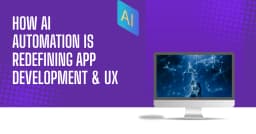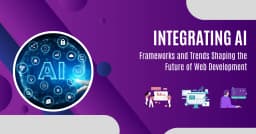How Artificial Intelligence is Revolutionizing Web Development
AI is transforming web development with automation, personalization & performance. Discover how it's reshaping the digital experience in today's web landscape.

In the fast-evolving world of technology, few innovations have had as significant an impact as artificial intelligence (AI). From personalized user experiences to code automation and performance optimization, AI is dramatically reshaping how websites are built, deployed, and managed. As we move into 2025, the role of Artificial Intelligence in Web Development is no longer a futuristic concept but a present-day reality that's transforming every layer of the digital experience. This blog explores how AI is transforming web development, key tools and trends, and what the future holds for developers and businesses alike.
The Rise of AI in Web Development
AI in web development refers to the integration of artificial intelligence technologies such as machine learning (ML), natural language processing (NLP), and computer vision into various stages of building and maintaining websites and web applications. This includes everything from writing code and testing to designing UI/UX and enhancing site security.
According to Gartner, the global AI software market is projected to hit $297 billion by 2025, indicating just how central AI will be to all industries — including web development.
AI's introduction into development workflows started with basic automation but has since evolved into sophisticated models that can understand intent, analyze user behavior, and even generate creative content or layouts. This trend signals a shift toward smarter and more adaptive digital experiences.
Benefits of AI in Web Development
- Improved Efficiency: AI can automate repetitive coding tasks, bug detection, and optimization processes, significantly reducing development time.
- Enhanced Personalization: AI-driven websites can deliver content, product recommendations, and interfaces tailored to each user.
- Real-Time Problem Solving: AI can monitor system behavior and automatically identify or fix performance issues.
- Cost Reduction: By automating key processes, businesses can save money on manual labor and reduce time-to-market.
- Accessibility Enhancements: AI tools help ensure websites are accessible by automatically analyzing layouts and content.
Furthermore, AI-driven development platforms empower non-developers to build applications through visual interfaces and natural language prompts. This democratization of development is making digital transformation more accessible to businesses of all sizes.
AI for Frontend Development
AI in frontend development is revolutionizing how interfaces are designed and optimized. AI-based tools like Uizard, Figma AI, and Adobe Sensei can automatically generate user interfaces based on basic text prompts or wireframes. These tools can also analyze user interaction data to recommend layout adjustments that improve user experience. Voice-based navigation, smart image recognition, and predictive user inputs are also being embedded into frontend layers using AI.
Additionally, developers now leverage AI to test multiple UI variants, gather user data in real-time, and iterate rapidly — boosting performance and user satisfaction.
AI in Backend Development
Backend development is also benefiting immensely from AI. Frameworks like OpenAI Codex and Amazon CodeWhisperer use machine learning to auto-generate code based on natural language inputs. These tools support developers in writing cleaner, more secure backend code faster than ever.
AI-powered web development can also involve predictive database management, load balancing, and auto-scaling systems — ensuring better server reliability and performance.
AI also helps in log monitoring, anomaly detection, and predictive maintenance, minimizing downtime and improving overall system health.
Source: OpenAI Codex, Amazon CodeWhisperer
AI-Powered Design and User Experience
One of the most exciting applications is AI-based website design. With AI tools, designers can:
- Analyze user behavior and heatmaps
- Predict user preferences and behavior
- Dynamically adjust layouts and content blocks
Platforms like Bookmark and The Grid use AI to auto-design entire websites, offering a base framework which designers can then fine-tune. This speeds up the design process and allows small businesses to go live faster with a polished web presence.
AI design systems can also evaluate color contrasts, font pairings, and content hierarchy to improve accessibility and branding consistency.
Source: Bookmark Website Builder
Machine Learning in Web Development
Machine learning in web development enables smarter features like recommendation engines, fraud detection, dynamic content delivery, and even automated SEO suggestions. For example:
- Netflix uses ML to optimize user experience with personalized thumbnails and recommendations.
- Shopify integrates ML for product suggestions and customer behavior analytics.
These capabilities are increasingly being adopted by websites of all sizes through third-party APIs and custom-trained models.
Machine learning can also help predict user drop-off points, identify high-performing content, and personalize conversion funnels in real time.
Source: Netflix Technology Blog, Shopify Engineering
AI Development Tools Empowering the Future
Here are some AI development tools revolutionizing the field:
- ChatGPT / OpenAI API – For code generation, chatbot integration, and testing.
- GitHub Copilot – Helps developers write code faster and with fewer errors.
- Google AutoML – Build custom machine learning models without deep AI expertise.
- TensorFlow / PyTorch – Popular frameworks for custom AI and ML development.
- DeepCode – AI-powered code review and security analysis.
These tools help developers automate not just writing code but also testing, documentation generation, and even DevOps tasks. As these platforms grow, the line between development and AI engineering continues to blur.
Source: GitHub Copilot, Google AutoML
The Impact of AI on Web Development Teams
The impact of AI on web development extends beyond tooling. It’s changing team dynamics:
- Developers shift from manual coding to managing AI-assisted workflows.
- Designers become curators of AI-generated layouts and UX decisions.
- QA engineers leverage AI to perform automated regression testing at scale.
AI allows teams to focus more on strategy, architecture, and creativity — reducing time spent on routine tasks. Collaboration is also evolving. Teams now use AI to bridge communication gaps between designers, developers, and stakeholders through natural language documentation, predictive project timelines, and intelligent version control.
Future of Web Development with AI (2025 and Beyond)
By 2025, expect more widespread use of:
- Conversational UIs using AI voice and chat interfaces
- AI-driven A/B testing that adapts in real-time
- Zero-code and low-code AI platforms that enable faster product iteration
- Predictive analytics and smart CMSs that adapt content based on user data
- Digital twins of websites that simulate real-time performance in virtual environments
These advancements will make web platforms more responsive, intelligent, and user-centric than ever before.
Challenges and Ethical Considerations
With great power comes responsibility. Key concerns include:
- Bias in AI algorithms
- User privacy and data protection
- Over-reliance on automation
Web teams must ensure transparency, ethical use of data, and regular auditing of AI behavior to build trust and reliability.
Frameworks like Google’s AI Principles and AI Ethics Guidelines by the European Commission provide essential guidance for teams aiming to implement AI responsibly.
Source: AI Ethics Guidelines
Conclusion
Artificial Intelligence in Web Development is no longer optional — it's becoming foundational. From streamlining development processes to enhancing UX and driving personalization, AI is unlocking new possibilities for how we build the web.
Whether you’re building a new platform or enhancing an existing one, understanding how AI fits into the development landscape is critical to staying competitive in 2025 and beyond.
Ready to explore how AI can power your next digital project? Let’s talk.
Latest Posts

AI-Powered Automation: Transforming App Development and User Experience
Manjeet Singh
Jan 8, 2026

React Router v7: The Remix Evolution That Rewrites the React Playbook
Abhishek Bhardwaj
Jan 2, 2026

Why Magento Is Still the Best Platform for Complex & Enterprise-Scale E-commerce
Manjeet Singh
Dec 31, 2025

How React Accelerates Business Growth with Scalable Front-End Solutions
Arun Verma
Dec 11, 2025

Integrating AI into Web Development: Frameworks and Future Trends
Manjeet Singh
Nov 12, 2025
![[object Object] profile picture](/_next/image?url=https%3A%2F%2Fres.cloudinary.com%2Fdkdsxusqu%2Fimage%2Fupload%2Fv1758892466%2FArun_Verma_4d80c2e44a.jpg&w=128&q=75)